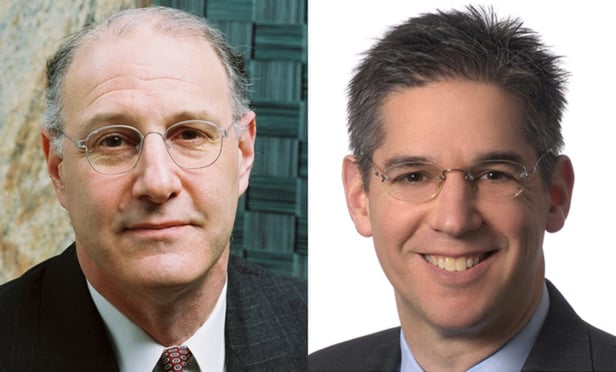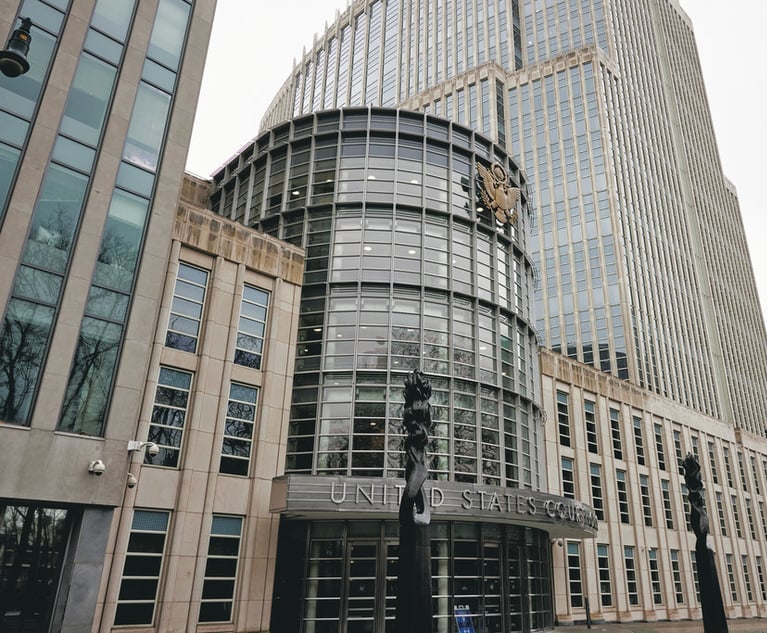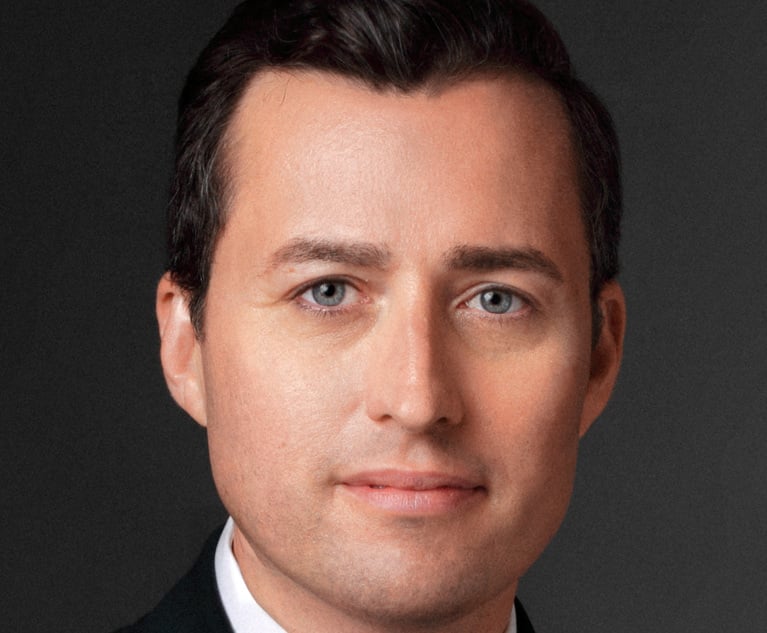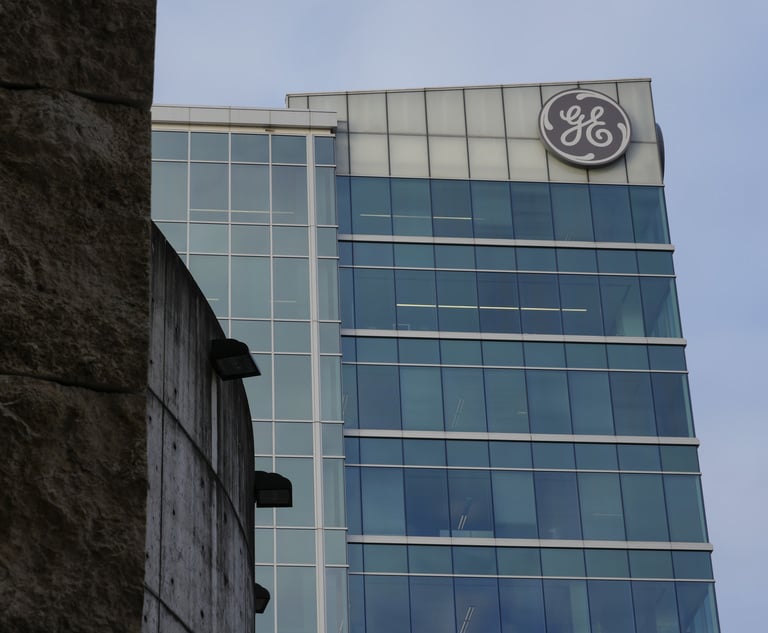Southern District Denies Insured's Request for Preliminary Injunction Seeking Payment of COVID-19 Related Loss
The central issue in dispute in the vast majority of these business-interruption loss cases is whether or not the insured can demonstrate that the loss resulted from physical loss or damage to property.
June 12, 2020 at 01:00 PM
9 minute read
 Howard B. Epstein and Theodore A. Keyes
Howard B. Epstein and Theodore A. Keyes
Across the nation, small businesses have filed insurance claims seeking coverage for lost income incurred as a result of the COVID-19 pandemic. According to news reports, and judging from the plethora of lawsuits filed, insurance companies are for the most part denying these claims for business interruption loss. In some instances, insurance companies are relying on virus or pandemic exclusions to support disclaimers. But the central issue in dispute in the vast majority of these cases is whether or not the insured can demonstrate that the business interruption loss resulted from physical loss or damage to property.
There are likely to be variables in each of these lawsuits that mandate different results in different cases. For example, the language of the insurance policies at issue may vary—and since insurance policies are contracts governed by the meaning of the terms, different policy language may mean different results. Further, each insured's claim may have its own unique set of facts, which may impact application of the policy terms.
In addition, the type of insurance claim at issue may make a difference. Is the insured claiming lost income due to suspension of operations resulting from damage to the insured's property? Is the insured claiming that the suspension of operations was caused by the order of a civil authority restricting access to the insured's property as a result of the pandemic? Or was the insured's business impacted by the shutdown of a supplier's facility due to property damage or an order of civil authority? Was the insured forced to cancel an event due to the pandemic?
These factors should prevent a one-size-fits-all type ruling, but the central issue is still likely to be whether or not the insured can demonstrate that loss results from physical loss or damage to property. On May 14, 2020, the United States District Court for the Southern District of New York became one of the first courts to weigh in on this issue, in the context of an insured's request for a preliminary injunction, and sided with the insurer. Social Life Magazine v. Sentinel Insurance Company Limited, Index No. 20 Civ. 3311 (VEC) (S.D.N.Y. May 14, 2020).
The Social Life Magazine Claim
According to court documents, the Social Life Magazine (SLM) is a monthly magazine published in the spring, summer and fall and distributed at retail businesses on the East End of Long Island. On March 17, 2020, SLM suspended business operations at its New York City office due to the COVID-19 pandemic. At around the same time, SLM filed an insurance claim under a Business Owner's Policy issued by Sentinel Insurance Company seeking coverage for a loss of business income. Sentinel denied the claim on the grounds that the loss was not caused by property damage at SLM's place of business or in the immediate area.
The Sentinel policy provided coverage for loss of business income due to the necessary suspension of operations, but specifically required that "suspension must be caused by direct physical loss of or physical damage to property" at the insured's premises. The policy also provided coverage due to loss of business income sustained when access to the insured's premises was "specifically prohibited by order of a civil authority as the direct result of a Covered Cause of Loss to property in the immediate area of" the insured premises. The Covered Cause of Loss provision specified "risks of direct physical loss."
After an unsuccessful attempt to persuade Sentinel to modify its position, SLM filed an action in the Southern District and sought a preliminary injunction requiring Sentinel to pay $197,000 in business interruption loss. According to SLM's application, these funds were necessary in order for SLM to publish and distribute a magazine in time for the weekend starting May 29, 2020. SLM argued that the magazine would not survive the loss of goodwill if it could not publish the May 29 issue.
In support of its application, SLM contended that the lost business income resulted from (i) a necessary suspension of business operations due to property damage caused by the coronavirus, and (ii) an order of civil authority prohibiting access to its office. In order to prevail on the request for a preliminary injunction, SLM was required to show (i) a likelihood of success on the merits; (ii) that it would suffer irreparable harm in the absence of the requested relief; (iii) the balance of hardships favored its position; and (iv) the public interest would not be disserved by a preliminary injunction.
Roundabout Theatre Case
In opposition to SLM's application, in addition to arguing that SLM could not meet the irreparable harm requirement, Sentinel argued that SLM could not show a likelihood of success on the merits because it could not demonstrate that suspension of operations was caused by direct physical loss of or physical damage to property at its New York City premises. Sentinel contended that SLM was forced to shut down not because of any property damage at the premises but because of governmental orders mandating that non-essential businesses close to limit the spread of COVID-19. According to Sentinel, these orders had nothing to do with physical property loss or physical damage to SLM's premises.
In its opposition papers, Sentinel relied on Roundabout Theatre Co. v. Contin. Cas. Co., a First Department decision involving the collapse of scaffolding at the construction site for the Conde Nast building in midtown. Roundabout Theatre Co. v. Contin. Cas. Co., 302 A.D. 2d 1 (1st Dep't 2002). As a result of the scaffolding collapse, a portion of West 43rd Street was temporarily closed and access to the insured Broadway theater, located two buildings over, was restricted, forcing the theater to cancel 35 performances of the musical Cabaret.
The insurance policy issued to the theater provided coverage for loss due to cancellation or postponement of performances "as a direct and sole result of loss of, damage to or destruction of property or facilities (including the theater building occupied … by the Insured and [certain equipment], contracted by the insured for use in connection with such Production, caused by the perils insured against, and occurring during the term of coverage …." 302 A.D. 2d 1, 3. The perils insured clause provided coverage for "all risks of direct physical loss or damage to" the theater building or facilities that was not otherwise excluded. Id.
In Roundabout Theatre, the First Department reversed a trial court ruling that had granted summary judgment to the theater and ruled that the policy language unambiguously provided coverage only where loss involves direct physical damage to the theater's property. The court held that coverage did not extend to the situation presented, where the theater was shut down solely due to off-site property damage at the Conde Nast building.
The Southern District Hearing
On May 14, 2020, counsel for SLM and Sentinel appeared for a telephone hearing before the Honorable Valerie E. Caproni for oral argument on the request for a preliminary injunction. At the hearing, according to the transcript, Judge Caproni immediately brought up Roundabout Theatre and challenged SLM's counsel to distinguish it. SLM's counsel argued that SLM had suffered on-site property damage due to the presence of the coronavirus, whereas in Roundabout Theatre the sole damage was off-site at the Conde Nast construction site. Judge Caproni rejected this argument, finding that the potential presence of the coronavirus on the SLM property, even if proven, would not satisfy the property damage requirement. The court explained that "what has caused the damage is that the governor has said you need to stay home. It is not that there is any particular damage to your specific property."
In addition to discussing Roundabout Theatre, Judge Caproni also relied on Newman Myers Kreines Gross Harris v. Great Northern Ins. Co., 17 F.Supp.3d 323 (S.D.N.Y. 2014). In Newman Myers, an insured law firm sought coverage for business interruption loss and extra expense after power to its offices at 40 Wall Street was shut off preemptively during Hurricane Sandy, rendering the offices inaccessible from Oct. 29 to Nov. 3, 2012. The Southern District granted summary judgment to the insurer, holding that the law firm could not satisfy the policy requirement to demonstrate that loss resulted from "direct physical loss or damage" by a covered peril to property, which requires "some form of actual, physical damage to the insured premises." 17 F. Supp.3d 323, 331. The court ruled that coverage did not extend to loss incurred due to "the forced closure of the premises for reasons exogenous to the premises themselves." Id. at 331.
Although Judge Caproni conceded that SLM's argument was creative, she denied the request for a preliminary injunction. According to the transcript, a written order was to be issued. However, subsequent to the hearing, on May 22, 2020, SLM filed a notice of dismissal without prejudice and the case was dismissed. As a result, it appears that no written order was issued.
Looking Forward
The Southern District holding in the SLM case is newsworthy because it is one of the first court rulings to address a business interruption coverage dispute related to the COVID-19 pandemic, and because it discusses the issue that will be at the center of most of these cases—can and must the insured demonstrate physical injury to its property. However, it would be a mistake to overstate the importance of this ruling. First, since the insured had sought a preliminary injunction, the burden the insured was required to satisfy was more difficult than insureds will face in most cases. Second, as the case was dismissed and no order was issued, it will be difficult to rely on the court's decision as precedent. Nevertheless, based on the transcript of the hearing, it is clear that claimants in New York courts will need to be prepared to address Roundabout Theatre and Newman Myers in connection with any motion practice concerning the merits of their business interruption loss claims.
Howard B. Epstein is a partner at Schulte Roth & Zabel, and Theodore A. Keyes is special counsel at the firm.
This content has been archived. It is available through our partners, LexisNexis® and Bloomberg Law.
To view this content, please continue to their sites.
Not a Lexis Subscriber?
Subscribe Now
Not a Bloomberg Law Subscriber?
Subscribe Now
NOT FOR REPRINT
© 2025 ALM Global, LLC, All Rights Reserved. Request academic re-use from www.copyright.com. All other uses, submit a request to [email protected]. For more information visit Asset & Logo Licensing.
You Might Like
View All
Insurance Company Sues Over 180 Health Care Providers for Fraud Under RICO
3 minute read
New York Court of Appeals Tightens Pleading Standards Against Insurance Policyholder
7 minute read
Amid Growing Litigation Volume, Don't Expect UnitedHealthcare to Change Its Stripes After CEO's Killing
6 minute read
GE Agrees to $362.5M Deal to End Shareholder Claims Over Power, Insurance Risks
2 minute readLaw Firms Mentioned
Trending Stories
Who Got The Work
J. Brugh Lower of Gibbons has entered an appearance for industrial equipment supplier Devco Corporation in a pending trademark infringement lawsuit. The suit, accusing the defendant of selling knock-off Graco products, was filed Dec. 18 in New Jersey District Court by Rivkin Radler on behalf of Graco Inc. and Graco Minnesota. The case, assigned to U.S. District Judge Zahid N. Quraishi, is 3:24-cv-11294, Graco Inc. et al v. Devco Corporation.
Who Got The Work
Rebecca Maller-Stein and Kent A. Yalowitz of Arnold & Porter Kaye Scholer have entered their appearances for Hanaco Venture Capital and its executives, Lior Prosor and David Frankel, in a pending securities lawsuit. The action, filed on Dec. 24 in New York Southern District Court by Zell, Aron & Co. on behalf of Goldeneye Advisors, accuses the defendants of negligently and fraudulently managing the plaintiff's $1 million investment. The case, assigned to U.S. District Judge Vernon S. Broderick, is 1:24-cv-09918, Goldeneye Advisors, LLC v. Hanaco Venture Capital, Ltd. et al.
Who Got The Work
Attorneys from A&O Shearman has stepped in as defense counsel for Toronto-Dominion Bank and other defendants in a pending securities class action. The suit, filed Dec. 11 in New York Southern District Court by Bleichmar Fonti & Auld, accuses the defendants of concealing the bank's 'pervasive' deficiencies in regards to its compliance with the Bank Secrecy Act and the quality of its anti-money laundering controls. The case, assigned to U.S. District Judge Arun Subramanian, is 1:24-cv-09445, Gonzalez v. The Toronto-Dominion Bank et al.
Who Got The Work
Crown Castle International, a Pennsylvania company providing shared communications infrastructure, has turned to Luke D. Wolf of Gordon Rees Scully Mansukhani to fend off a pending breach-of-contract lawsuit. The court action, filed Nov. 25 in Michigan Eastern District Court by Hooper Hathaway PC on behalf of The Town Residences LLC, accuses Crown Castle of failing to transfer approximately $30,000 in utility payments from T-Mobile in breach of a roof-top lease and assignment agreement. The case, assigned to U.S. District Judge Susan K. Declercq, is 2:24-cv-13131, The Town Residences LLC v. T-Mobile US, Inc. et al.
Who Got The Work
Wilfred P. Coronato and Daniel M. Schwartz of McCarter & English have stepped in as defense counsel to Electrolux Home Products Inc. in a pending product liability lawsuit. The court action, filed Nov. 26 in New York Eastern District Court by Poulos Lopiccolo PC and Nagel Rice LLP on behalf of David Stern, alleges that the defendant's refrigerators’ drawers and shelving repeatedly break and fall apart within months after purchase. The case, assigned to U.S. District Judge Joan M. Azrack, is 2:24-cv-08204, Stern v. Electrolux Home Products, Inc.
Featured Firms
Law Offices of Gary Martin Hays & Associates, P.C.
(470) 294-1674
Law Offices of Mark E. Salomone
(857) 444-6468
Smith & Hassler
(713) 739-1250






